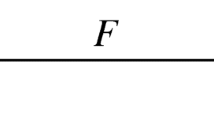Abstract
Some philosophers worry that if modal realism is true, you have no reason to prevent evils. For if you prevent an evil, you’ll have a counterpart somewhere that allows a similar evil. And if you refrain, your counterpart will end up preventing the relevant evil. Either way one evil is prevented and one is allowed. Your act makes no difference. I argue that this is mistaken. If modal realism is true, you are in a variant of Newcomb’s Problem. And if Lewis’ view about Newcomb’s Problem is true, then your act does make a difference and you should prevent the evil.
Similar content being viewed by others
References
Adams, R. (1974). Theories of actuality. Nous, 8, 211–231.
Ahmed, A., & Price, H. (2012). Arntzenius on ‘Why ain’cha rich?’. Erkenntnis, 77, 15–30.
Fischer, B. (2017). The moral objection to modal realism. Erkenntnis, 82, 1015–1030.
Gibbard, A., & Harper, W. (1981). Counterfactuals and two kinds of expected utility. In W. Harper, R. Stalnaker, & G. Pearce (Eds.), Ifs: conditionals, belief, decision, chance and time (pp. 153–192). Dordrecht: D. Reidel.
Heller, M. (2003). The immorality of modal realism, or: how i learned to stop worrying and let children drown. Philosophical Studies, 114, 1–22.
Horgan, T. (1981). Counterfactuals and Newcomb’s problem. Journal of Philosophy, 78, 331–356.
Horwich, P. (1987). Asymmetries in time. Cambridge, MA: MIT Press.
Krakauer, B. (2012). Counterpossibiles. Dissertation.
Krakauer, B. (2013). What are impossible worlds? Philosophical Studies, 165, 989–1007.
Leslie, J. (1991). Ensuring two bird deaths with one throw. Mind, 100, 73–86.
Lewis, D. (1968). Counterpart theory and quantified modal logic. Journal of Philosophy, 65, 113–126.
Lewis, D. (1978). Counterfactual dependence and time’s arrow. Nous, 13, 455–476.
Lewis, D. (1979). Prisoner’s dilemma is a Newcomb problem. Philosophy & Public Affairs, 8, 235–240.
Lewis, D. (1981). Why ain’cha rich? Nous, 15, 377–380.
Lewis, D. (1984). On the plurality of worlds. Oxford: Blackwell.
Acknowledgments
Thanks to the referees and editors of Erkenntnis. Special thanks to Referee 2.
Author information
Authors and Affiliations
Corresponding author
Additional information
Publisher's Note
Springer Nature remains neutral with regard to jurisdictional claims in published maps and institutional affiliations.
Rights and permissions
About this article
Cite this article
Hill, S. Modal Realism is a Newcomb Problem. Erkenn 87, 2993–3005 (2022). https://doi.org/10.1007/s10670-020-00336-y
Received:
Accepted:
Published:
Issue Date:
DOI: https://doi.org/10.1007/s10670-020-00336-y



